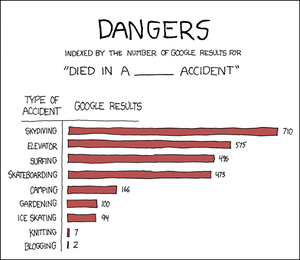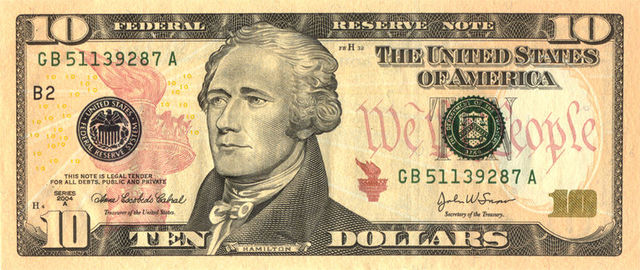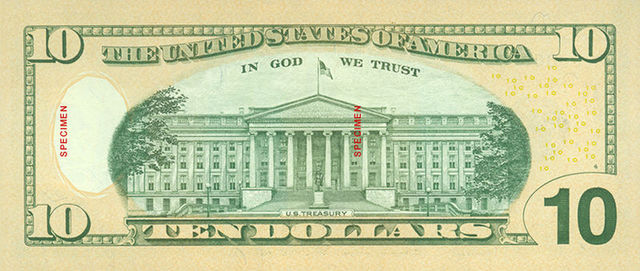Rosie O'Donnell is a great example of the failure of scientific education in this country. Of late, Rosie has joined the "truthers," using her show to flog the notion that the WTC was brought down in a government-planned controlled demolition.
I will have to yield to Popular Mechanics for most of the discussion about WTC7. However, I can, from my own engineering training, rebut one point on WTC1&2. (Note again, future commenters, this applies to WTC 1&2. There was a different dynamic at work in WTC 7).
Rosie, as others have, made a point of observing that jet fuel does not burn hot enough to melt steel, and therefore the fire in the main towers could not have caused the structure to yield and collapse. This is absurd. It is a kindergartener's level of science. It is ignorant of a reality that anyone who has had even one course in structural engineering or metallurgy will understand. The argument made that "other buildings have burned and not collapsed" is only marginally more sophisticated, sort of equivalent to saying that seeing an iceberg melts proves global warming. (Note that this is all written by a person who has no faith in government and is at least as suspicious about government motivations at any truther).
Here is the reality that most 19-year-old engineering students understand: Steel loses its strength rapidly with temperature, losing nearly all of its structural strength by 1000 degrees F, well below its melting point but also well below the temperature of burning jet fuel. For three years I designed piping and pressure vessel enclosures at a refinery. Many of the processes in a refinery crave heat and run better at elevated temperatures. In fact, what refineries can do, and how efficient they can be, is really limited by the strength of steel at high temperatures. Refineries end up being limited to process temperatures no higher than 600 to 800 degrees, and even then these require expensive special metallurgies. Anything higher requires a very expensive vessel lined with some sort of ceramic insulation material.
The strength curve of steel vs. temperature is dependent on the type of steel, but the curve below is about what I remember from my old textbooks. Note by 930 degrees the steel strength has dropped by half and in the next 100 degrees it halves again.

But the proof of what went wrong in WTC1 and WTC2 does not take a college education. You only have to look at building codes. Building codes generally require that structural steel members be coated with a fireproofing material.
As the critical temperature for steel is around 540°C (give or take, depending on whose country's test standards one reads at the time), and design basis fires
reach this temperature within a few minutes, structural steel requires
external insulation in order to prevent the steel from absorbing enough
energy to reach this temperature. First, steel expands, when heated,
and once enough energy has been absorbed, it softens and loses its
structural integrity. This is easily prevented through the use of fireproofing.
You have probably seen it- that foamy tan stuff sprayed on girders before the rest of the building is filled out. In fact, this stuff is not fireproofing per se but insulation. It is there to keep the structural steel cool during a fire, so the steel will not fail. Generally the standards are set in the code that the insulation has to be able to stand X time of fire (generally several hours) and keep the steel below its critical yielding temperatures. Engineers know that a building fire, which burns much cooler than a jet fuel fire, can cause steel members to weaken and fail and the building to collapse. If this were not the case, then why do builders spend billions every year to insulate structural steel building components??
I wrote about this issue in more depth here. In this post, one of the commenters listed a series of building fires and asked, why did these buildings not collapse? The answer is: Because insulation is applied to the building structural steel members to try to prevent the collapse. Even insulation is just a stopgap -- if the fire burns long enough and
hot enough (or if the insulation is stripped off, say by an airplane
shearing through the building) then the steel will heat up and fail. So there are three reasons that some buildings have fires and don't fail while the WTC did fail:
- Some building fires can and do cause buildings to collapse. Insulation on steel members help many buildings to survive, and often does save the building from collapse, but not always. This building did collapse, at least the top 6 stores. Oddly, this is actually used by truthers as further proof, somehow, that the WTC fires could not have brought down the building (the link is actually one of their web sites, I think). But in fact, the Madrid building failed the same way as WTC 1 and 2, with the top six floors collapsing. Since the building was not fully constructed on these top floors, there was not the huge weight collapsing that created the battering ram effect that brought down the WTC. The Madrid floors took longer to collapse, but they were 1) under far less stress, since the building above them was not complete; 2) the fire burned much cooler and 3) the insulation had not been mechanically scrubbed from the beams, so it took longer for the beams to heat up. To me, this is a clear parallel to the official version of the WTC collapse, but even this is distorted somehow by the truthers.
- Fuel burns hotter than normal building fires, so even insulated members will heat up faster. I have many pictures in my personal collection of refinery fires where the main thing you can see in the aftermath is all the structural steel bent and collapsed. Truthers may not be able to find many examples of building collapsing in a fire, but you would be hard-pressed NOT to find examples of collapsed structural steel at every refinery and petrochemical fire.
- The insulation that normally protects buildings was stripped off by the mechanical action of an enormous airplane shearing through the building at 300 miles an hour.
This is in addition to the actual removal of some support columns by the crashing aircraft, which put more load on the remaining structure and thereby hastened the collapse.
postscript: By the way, can anyone tell me why the so called "reality-based"
community, that so often criticizes the Right for theocratic attacks on
science, is so quick to fall for this pseudo-scientific junk?
Update: One other thought: The hallmark of truthers is that they take small abnormalities or uncertainties in the failure analysis and event reconstruction as justification for throwing out the whole explanation of events in favor of an alternate series of events with much, much larger gaps, contradictions, and logical problems (e.g. how did the buildings get wired for demolition without anyone noticing? or, how did the planes manage to crash into the precise floors wired for demolition without dislodging the charges and their wiring? or, how did such a massive conspiracy get pulled off without one leak when the administration can't even competently fire 9 US attorneys?)
Anyone who has ever done root cause analysis of a catastrophic failure knows there are always questions no one can answer when all is said and done. And people who say things like "always happen" or "can never happen" typically don't have any real-world engineering experience.
Update2: One other thought on WTC7, since most of the sites I have visited over the last several days really seem to focus on WTC7. I consider our government capable of all kinds of hijinx, but why WTC7? I would argue that about 0.00001% of the outrage that resulted from 9/11 is attributable to WTC7. How many people not associated with the truthers have even heard of WTC7? In fact, one could argue that the strike on the Pentagon was effectively irrelevant, since no one really even seems to remember that one.
One minor note: I saw on a conspiracy site the claim that all military planes were ordered to stand down on 9/11. I know from personal experience that can't possibly be true. I was in Manhattan during 9/11 and remember well people in the streets hitting the ground in fear every time a military jet rocketed over the city.
I don't buy all this conspiracy theory not because I think well of the government, but just the opposite. I consider the conspiracies posited at these various sites to be orders of magnitude beyond this government's capabilities. Remember Coyote's Law:
When the same set of facts can be explained equally well by
- A massive conspiracy coordinated without a single leak between hundreds or even thousands of people -OR -
- Sustained stupidity, confusion and/or incompetence
Assume stupidity.
Update3: I guess I need to throw out a few more things. This was not meant to be a comprehensive or definitive rebuttal of the 9/11 conspiracy theories. I merely used as a starting point one stupid comment by Rosie O'Donnell on melting, a comment I have heard a lot of times, and that I knew I could refute of my own knowledge. Those who want to get mad at me because I did not refute this or that, sorry, go deal with the book by the Popular Mechanics guys. The only other thing I can contribute other than engineering sanity is the fact I have participated in many engineering failure analyses and the fact that I watched the towers fall live, with my own eyes, from the streets of Manhattan.
Every single engineering failure analysis I have ever participated in, from refinery explosions to airplane crashes, has always left unanswered questions and nagging inconsistencies that had, I am sure, nothing to do with conspiracies. We had many things we could never explain about a heat exchanger fire at our refinery in 1985, but I don't think that those unknowns and uncertainties leave the door open to blame government agents for the fire.
I'll say again, if you want to argue that the WTC buildings were demoed by explosives, you have to explain how the explosives were laid, and, more important, how the explosives and their delicate wiring and detonators survived a plane crashing into the same floors. And by the way, given that the buildings had not external markings showing the floors, how did the people flying the airplanes hit the exact correct parts of the building? For every problem with the core hypothesis I could name 10 problems with the truther alternative. I have no problem with offering an alternative hypothesis to the original thesis, but it is silly to criticize the core thesis for small problems only to replace it with a hypothesis that has problems that are orders of magnitude larger.



